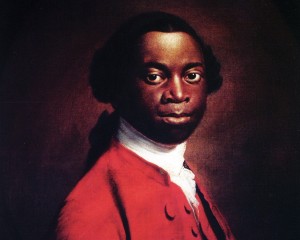
Equiano Olaudah, abolitionist, born 1745, was the Ibo, Nigerian-born author of an autobiography, The Interesting Narrative of the Life of Olaudah Equiano, or; Sustarus Vassa, The African, which was purposed after showing the “enormous cruelties practiced on his fabled brethren, and to strengthen the prevailing sentiment against the trafficking of humans.” Equiano was captured with his sister in the Ibo region of present day Nigeria in 1756 while his parents were away and was sold to slave traders headed to the West Indies. As he passed from one hand to another, he once had a difficult reunion with his sister before they were finally separated. Equiano served masters who sold him afterward, stayed in Virginia and traveled across the North Atlantic with British navy vessels and captains of slave ships, one of who was Henry Pascal who gave him the name Gustavas Vassa that he used all his life except in his autobiography. Under Pascal’s household, Equiano learnt to read and write, and to do arithmetic. He was again sold and resold till he got to the Quaker merchant Robert King who allowed him to engage in minor trading activities, by which he earned his freedom in 1766.
Travels
In 1767, Equiano moved to London, where he worked with scientist, Dr. Charles Irving. In 1773, he accompanied Irving to the Artic in search of a northern route to India. When he returned to London he came in contact with anti-slavery campaigner, Granville Sharp, a civil servant and leading defender of African people in London. He spent much of the time before 1786 travelling the world, to turkey and to the Caribbean where he tried to better the lot of plantation slaves he came in contact with. There he was reminded of the inhumanity dealt members of his race and he was himself nearly re-captured as slave. When he finally settled in London in 1786, he joined the abolitionist group, “Sons of Africa,” actively supporting anti-slavery bills in the parliament. Believing his life’s story could stir the nation’s conscience, Equiano published his autobiography in 1789.
Book
Due to some certain historical forces such as Slave Trade and Imperialism, it was inevitable that the first African writers should be preoccupied with the theme of slavery and exile. It is not also by accident that their first attempts at literary activity should coincide with anti-slavery movement of the 8th century, they wrote in support of the movement. Apart from being Africans or of African origin, the writer’s obvious qualification was their experience of slavery, and little or no education. But Black literary activity which began in 1770 reached its climax with the publication of The Life of Olaudah Equiano, or; Sustarus Vassa, The African; written by himself (1798), a work which became an immediate success and was translated into several European languages before the end of that century, and brought Equiano into the very forefront of the anti-slavery movement. The autobiography in reality goes beyond the crude sentimental appeal to human sympathy. It seeks to alter completely the contemporary image of the African in England and the colonies and enthrone the new African man who combined a romantic love of his native land with a critical admiration of European administration. As literature, the interesting narrative remains very significant in the history of African literature inn English. And although its target audience is anti-slave trade, its position among the black people all over the world cannot be ignored. It marks the climax of Africa’s creative effort in the 18th Century and channeled future directions of modern African writings that have become relics of the continent’s colonial past. The book remains best example protest literature, the dominant and defining characteristic of African literature.
Equiano travelled widely to promote this book; a commercial success which ended up serving the abolitionist cause which he campaigned for in the last eight years of his life. He married English woman Susanna Cullen with whom he had two daughters. In 1807, ten years after Equiano’s demise, slave trade was abolished in British ships.
Guardian NG January, 2000





















